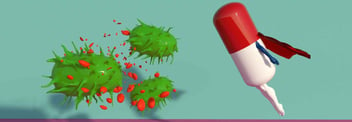Your Mighty Moody Microbiome – Part 11 Villainous Gut Bugs Bedevil Bipolar Patients?
- Home
- Blog

Reader, are you in awe over the effects of those 100 trillion bugs that live inside of us in promoting our health, or contributing to many of our chronic diseases? I know that I am. In that spirit, did you know that there may well be more genes in our microbiome than stars in the universe?
Here is an amazing fact… happy and healthy mice raised in a sterile environment, who have no microbiome, become depressed when they receive a fecal transplant from a depressed human!
Last week we discussed the cinematic tropes of heroes and villains. In the spirit of Halloween, I’d like to continue this week by discussing another trope, found in nearly every classic horror plot, from The Telltale Heart to Scream. The trope goes like this: you recognize the antagonist. Perhaps you hide. But suddenly, you get the creeping sensation that the evil villain isn’t outside at all: he’s inside the house. Worse yet, he’s inside your very room! But there’s something worse even beyond that: What if the villain is inside your very own body?
Thus far in our series on the microbiome, we’ve considered our gut bugs as a team-player, as a pet, and as a villain that probiotics could “conquer” with a one-two punch. But sometimes, our microbiomes may play the role of a different type of villain—one that lives discretely inside our bodies and influences our other bodily systems to impact our mental health for the worse. This week, we’re going to investigate the microbiome’s role in bipolar disorder and mania. Reader: the gut bugs living within us may have an insidious effect on our mental health… but take heart. Even this villain can be conquered through personalized medicine and targeted care.
Is There Such Thing as a Leaky Gut Bipolar Microbiome?
As we learned last week, depression is a multifaceted mental illness that has multiple points of origin throughout our bodies, including our brain, our gut, and our immune system. Bipolar disorder lives in the body in a similar way, and as with depression, there is often a genetic component to the disorder, which can be better understood through genetic tests like Genomind’s Professional PGx. But the two illnesses have significant differences in terms of their outward manifestation. Individuals with depression report feelings of not just sadness but emptiness and worthlessness. While depressed patients might feel better some days than others, their mood and their energy levels remain low. Individuals with bipolar disorder also feel that sense of emptiness and have deep “low” periods—but they also have periods of hypomania or mania, where they seem to be overtaken by a restless, relentless energy. Studies have shown patients with depression have a markedly different microbiome than individuals without depression—and now research suggests that patients with bipolar disorder have distinct features in their microbiome as well that differ from the rest of the population.
As with depression, patients suffering from bipolar disorder display reduced levels of microbial diversity in general, and also exhibit higher levels of intestinal inflammation and symptoms of a leaky gut. But the microbiomes of individuals suffering from bipolar depression also have one distinct feature in common: they have a significantly lower amounts of two types of bacteria known as Faecalibacterium and Ruminococcaceae when compared to healthy individuals without the disorder. Higher levels of these bacteria have been associated with better sleep, better mood, and better overall health. Significantly, these bacteria have also been shown to have anti-inflammatory properties—if you’ve been following along with the blog, you know chronic inflammation is one of the causes of numerous negative health outcomes…. In other words, the more anti-inflammatory gut bugs, the better! Lower levels Faecalibacterium have been associated with many negative health outcomes such as Leaky Gut Syndrome, ulcerative colitis, irritable bowel syndrome, colorectal cancer, and diarrhea. Higher levels of Faecalibacterium offer improved health outcomes—and indeed, early studies indicate that therapeutically increasing this bacteria in bipolar patients could lessen the burden of the disease.
Low levels of Faecalibacterium are not the only biological contributor to bipolar disorder, however—like a villain that is wreaking havoc inside the house, a dysregulated microbiome can also disrupt numerous mood-regulating systems within your brain, as we will now explore.
How Your Bipolar Gut Bugs, Your Immunity, and Antibiotics Perpetuate a Vicious Cycle of Dysregulation
Bipolar disorder has been increasingly associated with abnormalities in the body’s immune system—more specifically, in periods of mania, patients’ immune systems display significant alterations before returning to normal levels. But studies have also shown that individuals undergoing an episode of mania have an “increased rate of recent antibiotic exposure compared to a normal population.” This raises questions about the interrelation between a patient’s immune system, microbiome, and bipolar disorder. Because many bipolar individuals suffer from dysbiosis and a leaky gut, they may be at greater risk of bacterial infection, which then leads doctors to prescribe antibiotics. But antibiotics themselves have been known to diminish the health and diversity of a patient’s microbiome, which essentially perpetuates or worsens an already compromised immune system.
The connection between antibiotics and mania has been made enough times that a name has been given to it: “antibiomania”. However, more research must be conducted to determine the precise mechanisms at work between these factors. If antibiotics worsen symptoms of bipolar disorder, what alternatives could be prescribed to mitigate their effects? Further, studies have shown that overstimulation of the immune system can contribute to bipolar disorder. If mania is at least partially rooted in immunological abnormalities, could the answer to easing bipolar disorder possibly lie in treating the immune system by treating the gut? As we’ve learned in this series, the gut plays a major role in bolstering our immunity. Understanding the cycle of immune system compromise, the gut microbiome, and antibiotics will be a crucial factor in future treatment of bipolar disorder.
In the future, will patients suffering from intractable bipolar disorder symptoms receive a fecal transplant?
Probiotics to the Rescue!
Every year in the United States, 3 million people are diagnosed with bipolar disorder. Typical treatment may involve prescription of antipsychotic medication or mood stabilizers and regular psychotherapy. But the frontiers of medical research suggest that treating bipolar disorder by treating the microbiome could provide an alternate therapeutic route. As with depression, in bipolar patients probiotics may provide a mighty answer to the villain lurking in our own bodies. Administration of Faecalibacterium and Faecalibacterium and Ruminococcaceae could help bolster bipolar patients’ lower levels of the bacteria, and taking probiotics more generally eases the symptoms of a leaky gut. Finally, if antibiotics do indeed play a role in the disease, probiotics could act as a protective agent against the destruction of the microbiome they cause.
The time is ripe for more research about the connection between bipolar disorder and the microbiome—but what we know now is promising in terms of what solutions lie ahead.
Related Information
- Learn about Genetic Testing
- Learn about Potomac Psychiatry
- Meet Our Doctors
- Contact Potomac Psychiatry
.png?width=144&height=144&name=Untitled%20design%20(34).png)



